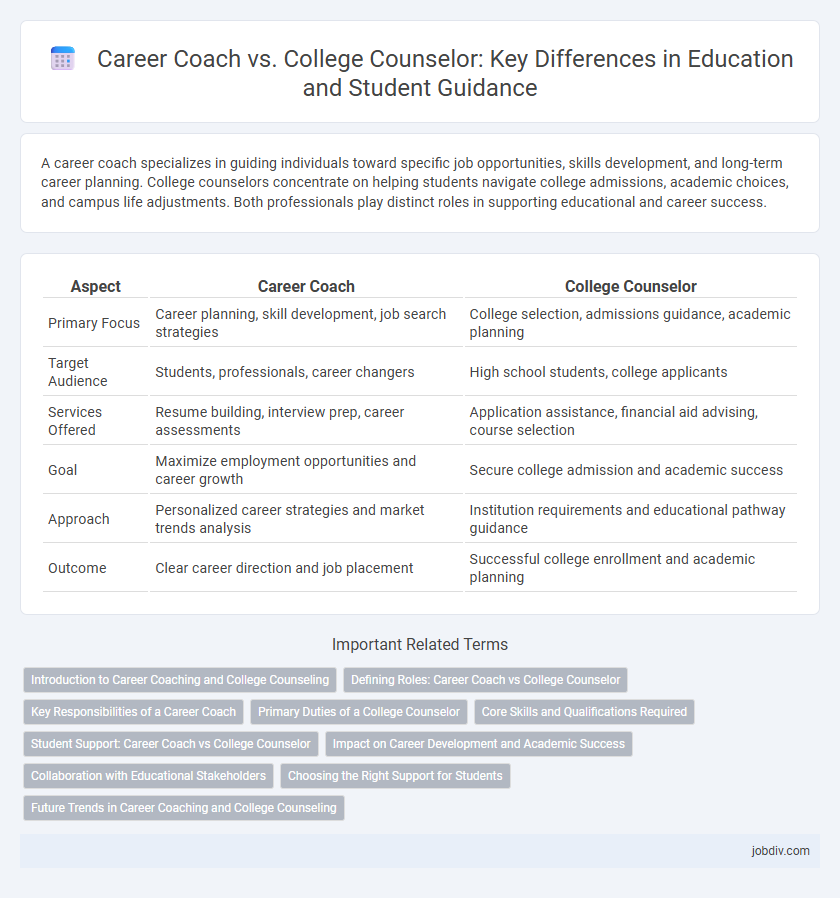A career coach specializes in guiding individuals toward specific job opportunities, skills development, and long-term career planning. College counselors concentrate on helping students navigate college admissions, academic choices, and campus life adjustments. Both professionals play distinct roles in supporting educational and career success.
Table of Comparison
| Aspect | Career Coach | College Counselor |
|---|---|---|
| Primary Focus | Career planning, skill development, job search strategies | College selection, admissions guidance, academic planning |
| Target Audience | Students, professionals, career changers | High school students, college applicants |
| Services Offered | Resume building, interview prep, career assessments | Application assistance, financial aid advising, course selection |
| Goal | Maximize employment opportunities and career growth | Secure college admission and academic success |
| Approach | Personalized career strategies and market trends analysis | Institution requirements and educational pathway guidance |
| Outcome | Clear career direction and job placement | Successful college enrollment and academic planning |
Introduction to Career Coaching and College Counseling
Career coaching focuses on guiding individuals through career development, skill assessment, and job market navigation, emphasizing personalized strategies for career success. College counseling primarily assists students in academic planning, college selection, and admissions processes to enhance educational outcomes. Both roles support personal growth but target distinct phases of educational and professional journeys.
Defining Roles: Career Coach vs College Counselor
Career coaches specialize in guiding individuals through career exploration, skill development, and job search strategies, emphasizing professional growth and employment outcomes. College counselors focus on academic advising, college selection, admissions processes, and financial aid planning, aiming to support students' educational pathways and campus integration. Both roles are essential in education but target different stages and objectives within student development and career readiness.
Key Responsibilities of a Career Coach
Career coaches guide students and professionals through career planning, skill assessment, and job search strategies, focusing on aligning strengths with career goals. They offer personalized advice on resume building, interview preparation, and networking techniques tailored to specific industries. Unlike college counselors, career coaches emphasize long-term professional development and market readiness beyond academic settings.
Primary Duties of a College Counselor
College counselors primarily guide students through academic planning, college application processes, and financial aid options to ensure successful enrollment in postsecondary institutions. They assess students' strengths and interests to recommend suitable educational paths and provide support in meeting admissions requirements. These professionals also coordinate with families and educators to address student challenges and promote overall academic achievement.
Core Skills and Qualifications Required
Career coaches require expertise in industry trends, career planning, and interpersonal communication to guide clients in professional development and job search strategies. College counselors must possess in-depth knowledge of academic requirements, admission processes, and student psychology to effectively support college-bound students. Both roles demand strong analytical skills, empathy, and the ability to build personalized guidance plans tailored to individual goals.
Student Support: Career Coach vs College Counselor
Career coaches specialize in providing students with personalized career guidance, skill development, and job search strategies tailored to industry demands and labor market trends. College counselors focus on helping students navigate the college application process, financial aid options, and academic planning to ensure admission and success in higher education. Both roles support student success but address different stages and aspects of educational and professional development.
Impact on Career Development and Academic Success
Career coaches focus on personalized career planning and skill development, directly enhancing employability and professional growth, while college counselors primarily guide academic decisions and college admissions, supporting academic success. The impact of career coaches is evident in improved job readiness and clearer career paths, whereas college counselors help students align academic goals with college requirements. Both professionals contribute uniquely to students' long-term success by integrating career development strategies with academic achievements.
Collaboration with Educational Stakeholders
Career coaches collaborate closely with employers, alumni networks, and internship coordinators to align student skills with job market demands, enhancing employability outcomes. College counselors work alongside academic advisors, financial aid officers, and admissions teams to support students' educational planning and access to resources. Both roles engage with faculty and families to provide a comprehensive support system that fosters student success and career readiness.
Choosing the Right Support for Students
Career coaches provide personalized guidance focused on professional development, skill-building, and job market navigation, while college counselors specialize in academic planning, college applications, and scholarship opportunities. Students seeking practical career strategies and industry insights benefit from career coaches, whereas those requiring assistance with educational pathways and enrollment processes should consult college counselors. Understanding the distinct roles ensures students receive targeted support aligned with their immediate goals and long-term aspirations.
Future Trends in Career Coaching and College Counseling
Future trends in career coaching emphasize personalized AI-driven assessments and virtual reality simulations to enhance skill development and job matching accuracy. College counseling is increasingly incorporating data analytics and mental health integration to support holistic student success and informed decision-making. Both fields are moving towards hybrid models combining digital tools with human expertise to address evolving educational and career landscapes.
Career Coach vs College Counselor Infographic

 jobdiv.com
jobdiv.com